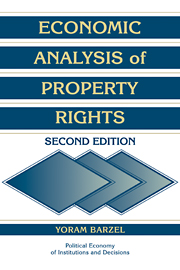Book contents
- Frontmatter
- Contents
- Series editors' preface
- Preface to the second edition
- Preface to the first edition
- Introduction
- 1 The property rights model
- 2 The public domain: Rationing by waiting and price controls
- 3 Contract choice: The tenancy contract
- 4 Divided ownership
- 5 The old firm and the new organization
- 6 The formation of rights
- 7 Slavery
- 8 Wealth-maximizing constraints on property rights
- 9 Property rights and non-market allocation
- 10 Additional property rights applications
- 11 The property rights model: Recapitulation
- References
- Index
2 - The public domain: Rationing by waiting and price controls
Published online by Cambridge University Press: 05 June 2012
- Frontmatter
- Contents
- Series editors' preface
- Preface to the second edition
- Preface to the first edition
- Introduction
- 1 The property rights model
- 2 The public domain: Rationing by waiting and price controls
- 3 Contract choice: The tenancy contract
- 4 Divided ownership
- 5 The old firm and the new organization
- 6 The formation of rights
- 7 Slavery
- 8 Wealth-maximizing constraints on property rights
- 9 Property rights and non-market allocation
- 10 Additional property rights applications
- 11 The property rights model: Recapitulation
- References
- Index
Summary
In the following discussion an elaboration of a single example – the gasoline price controls of the 1970s – serves to illustrate the usefulness and power of the property rights framework. It also introduces tools that are useful in analyzing situations not subject to government intervention, in which the price of a commodity (or a commodity-attribute) differs from the (supposed) market clearing price.
Chapter 1 presented a property rights proposition central to this book: Given that property rights are never perfectly delineated, some valued properties will always be in the public domain. In the present chapter the nature of maximization, as affected by properties in the public domain, will be examined and the actual resolutions of several public domain issues will be analyzed. Because an analysis of rationing by waiting offers a convenient introduction to the subject of property rights, I will briefly concentrate on such an analysis; subsequent discussion will provide a more detailed analysis of maximization under price controls, which will highlight major features of the substance and the mechanics of property rights.
RATIONING BY WAITING
The rationing by waiting model used here, which is stripped of many real-world features, is most elementary. Using this model makes it easy to concentrate on the public domain issue while ignoring peripheral problems. I will use the results of this basic analysis in my subsequent analysis of the price controls placed on gasoline in the early 1970s.
Information
- Type
- Chapter
- Information
- Economic Analysis of Property Rights , pp. 16 - 32Publisher: Cambridge University PressPrint publication year: 1997
